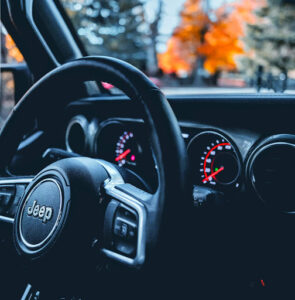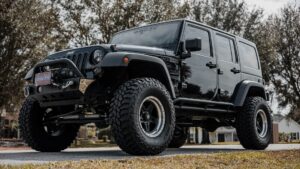One characteristic that has become an integral theme of Jeep vehicles is performance and durability. These two characteristics are usually in tandem and for that reason, there are very few discussions about Jeep mechanical problems.
Jeeps like all vehicles are not immortal and once in a while Jeep owners are bound to face problems with their cars, in most instances minor problems. One of the most common problems that Jeep owners have to deal with is the loud noise.
Contents
Do All Jeep Engines Normally Get Loud?
Normally your Jeep is not supposed to be extremely loud, especially when we are talking about luxury models like the Grand Cherokee.
As your car ages and your mileage hits the high thousands, there is found to be an increase in the decibels that your Jeep engine produces.
Regardless of how aged the car is, if it’s in good condition the noise your Jeep makes should not be loud enough that you consistently notice it. Most people that drive Jeeps, barely ever get to a point where their Jeep makes extremely loud noises.
The reason for this is regular and professional service. Barring poor workmanship and a great degree of negligence, normally your Jeep should not get too loud.
Is Your Jeep Engine Loud (How Loud Should It Be?)
We have highlighted that normally Jeep engines maintain the low count on the “decibel meter”. Just how loud is loud though? This is a very important question.
Remember, most of the Jeep models come with very powerful engines, most of the V8 engines. In comparison to other car models, they are bound to be significantly louder. The engine often produces a roaring sound and although loud it’s often bearable and for most people, it is a point of pride.
The problem comes when other sounds tend to significantly overpitch and sound louder than the roaring engine.
In terms of how loud your engine should sound, the answer is quite simple as long as it is not too loud to distract you from driving.
What you should be worried about though is the type of sound your car is producing. If it is a clicking sound, rattling sound, or a ticking sound, chances are your Jeep has quite a big problem. These distinct noises are quite annoying, you are bound to notice them.
Should I be Worried About the Engine Noise
A loud engine can be a great point of concern for Jeep owners. The sad part is that in some cases you might be over the edge over some really simple problems that you can fix for yourself.
If the increased engine sound is the normal engine sound but just louder, it might be just your engine giving in to mileage.
On the other hand, if there is a ticking, clicking, or rattling sound there might be a great deal to worry about. Before raising an alarm over a loud noise, it is important to first try and identify the noise.
In conclusion, loud engine noise is always a signal that your Jeep is not in great shape and you should be worried.
If the sound your engine is making is a clicking, rattling, or ticking sound then you have to be worried because these sounds often signal some significantly larger problems.
What Causes the Loud Engine Noise?
Loud engine noises are a result of several issues on your Jeep, most of the mechanical. The causes of loud noises include,
Out Of Shape Spark Plugs
One of the most essential engine components is spark plugs. The working principle of the spark plugs is that they ignite the combustion that results in the production of the energy that results in your car moving.
If spark plugs are not functioning properly, they result in a misfiring engine. The misfiring coupled with sputtering will result in a relatively louder driving experience.
Spark plugs are rarely the culprit for loud noises on your Jeep but in the instances that they are the loud engine can be quite unbearable.
The Exhaust System
We have highlighted how rattling can be quite a huge problem for Jeep owners. In most instances, the loud rattling noise is a result of a faulty exhaust system.
A loose heat shield or a faulty catalytic converter can result in a louder running noise for your engine.
If it is the catalytic converter that is the root of the problem, your car will eventually outright stop running if the catalytic converter gets blocked.
Usually, if the catalytic converter is faulty, your Jeep will exude a strong “rotten egg” odor that is a result of the sulfur reactions.
Leaks in the exhaust manifold and broken tailpipes can also result in sputtering and in the end louder a louder engine.
The exhaust manifold is one of the most precarious systems on your Jeep and as a result of wear and tear, it can leak.
Leaks are pretty difficult to spot and, in most instances, you are going to need to hire the services of a professional mechanic to help you identify and navigate the problem.
The good thing about leaks is that if you have modern Jeeps, a fault exhaust manifold will trigger the check engine light. This means that you won’t need professional help to diagnose the cause of your loud engine problem.
Aftermarket Spares
Getting spares and services from Jeep especially after your warranty period has lapsed can be quite pricey. Most people end up opting for aftermarket spares. Using aftermarket spares though can result in your engine running louder than it normally should.
For instance, having an aftermarket filter on Jeep models like the Wrangler can result in your engine running louder. Even if it fits perfectly, if it is not from Jeep there can be incompatibility issues that result in the loud engine noise.
Aftermarket parts like the air filter often result in ticking noise which is one of the most annoying engine loud noises that plague Jeeps.
Other factors result in loud engine noises.
These include worn-out seals and gaskets, dirty mass airflow sensors, and also faulty oil pumps.
Can Jeep Loud Engine Noise Be Fixed?
The good news about the loud engine noise for Jeeps is that most of the causes can be rectified and your engine will go back to sounding normal again.
For the exhaust noises, it is important to hire the services of a professional mechanic to help you deal with the problem. The engine check light will only go as far as showing you that the exhaust might have a problem. But identifying the problem might be a lot more complex.
Once the problem in the exhaust has been identified, the leak can be welded to close it through or the loose heat shield can be fitted back into place.
If it is the catalytic converter at fault then replacing it might be the best foot forward if you want to fix the loud noise.
If it is the spark plugs at fault replacing them or cleaning them can with a swoop solve your loud engine problems.
It is very important though to ensure that the spark plugs are the problem.
This is because replacing spark plugs is an expensive exercise and before going about it, you should be sure that the spark plugs are at fault. Enlist the service of a professional mechanic to diagnose and if the spark plugs are indeed faulty replace them.
In a scenario where your aftermarket spares causing ticking noise, fixing the problem is easy. Just stick to spares from the manufacturer.
That is quite easy and if it’s the air filter causing your problems, YouTube tutorials can help you replace it with one from the manufacturer with ease.
FAQ
What causes Jeep Engines to be loud?
There are several causes of engine loud noise, these include faulty exhaust systems, incompatible air filters, and broken cylinder heads.
Why Is My Jeep Loud When I accelerate?
As you accelerate, your faulty Jeep components are stretched and this results in loud noises. To identify the specific cause you must consult a mechanic
Can I fix the loud noise from my Jeep?
Yes, the loud engine noise produced by Jeeps can be fixed. You can get the help of the above guide for that.
Conclusion.
Loud engine of a jeep can be annoying for some users while some jeepers get used to it. But the important thing is doing some checking for the cause of the loud engine.
That can be due to some fault of the spark plugs, filters, cylinder heads, exhaust system or something else.
If we drive our jeeps without caring about the issue, some of the above issues can cause more serious damages to our engines. Because of that it’s better to find out and fix the cause of the loud engine, before it ends up with a disaster!
If you think this guide may be helpful for someone else, you can share this with them. You just have to hit one of the share buttons below!
Peace!!



